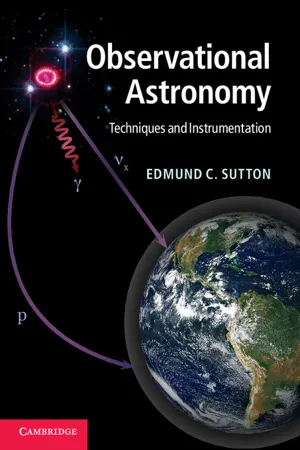
- English
- PDF
- Available on iOS & Android
About this book
Astronomy is fundamentally an observational science and as such it is important for astronomers and astrophysicists to understand how their data are collected and analyzed. This book is a comprehensive review of current observational techniques and instruments. Featuring instruments such as Spitzer, Herschel, Fermi, ALMA, Super-Kamiokande, SNO, IceCube, the Auger Observatory, LIGO and LISA, the book discusses the capabilities and limitations of different types of instruments. It explores the sources and types of noise and provides statistical tools necessary for interpreting observational data. Due to the increasingly important role of statistical analysis, the techniques of Bayesian analysis are discussed, along with sampling techniques and model comparison. With topics ranging from fundamental subjects such as optics, photometry and spectroscopy, to neutrinos, cosmic rays and gravitational waves, this book is essential for graduate students in astronomy and physics. Electronic and colour versions of selected figures are available online at www.cambridge.org/9781107010468.
Frequently asked questions
- Essential is ideal for learners and professionals who enjoy exploring a wide range of subjects. Access the Essential Library with 800,000+ trusted titles and best-sellers across business, personal growth, and the humanities. Includes unlimited reading time and Standard Read Aloud voice.
- Complete: Perfect for advanced learners and researchers needing full, unrestricted access. Unlock 1.4M+ books across hundreds of subjects, including academic and specialized titles. The Complete Plan also includes advanced features like Premium Read Aloud and Research Assistant.
Please note we cannot support devices running on iOS 13 and Android 7 or earlier. Learn more about using the app.
Information
Table of contents
- Cover
- OBSERVATIONAL ASTRONOMY
- Title
- Copyright
- Contents
- Illustrations
- Tables
- Preface
- Acknowledgements
- 1 Astrophysical information
- 2 Photometry
- 3 Positional astronomy
- 4 Fourier transforms
- 5 Detection systems
- 6 Orthodox statistics
- 7 Stochastic processes and noise
- 8 Optics
- 9 Interference
- 10 Spectroscopy
- 11 Ultraviolet, x-ray, and gamma ray astronomy
- 12 Radio receivers, spectrometers, and interferometers
- 13 Modern statistical methods
- 14 Neutrino detectors
- 15 Cosmic ray detectors
- 16 Gravitational waves
- 17 Polarimetry
- Appendix A Physical constants and units
- Appendix B Acronyms
- Appendix C Additional reading
- References
- Index